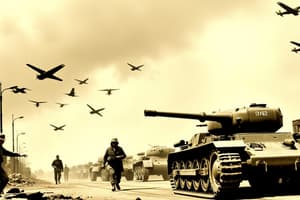Podcast
Questions and Answers
What was one of the contributing factors to the outbreak of World War 2?
What was one of the contributing factors to the outbreak of World War 2?
Which event imposed harsh penalties on Germany after World War 1?
Which event imposed harsh penalties on Germany after World War 1?
Who was the leader of Germany who falsely accused Poland, starting World War 2?
Who was the leader of Germany who falsely accused Poland, starting World War 2?
Which alliance did Germany, Italy, and Japan form during World War 2?
Which alliance did Germany, Italy, and Japan form during World War 2?
Signup and view all the answers
What significant event during World War 2 targeted the Jewish population?
What significant event during World War 2 targeted the Jewish population?
Signup and view all the answers
What was one of the countries in the Allied powers during World War 2?
What was one of the countries in the Allied powers during World War 2?
Signup and view all the answers
What event during the Japanese occupation of the Philippines resulted in the deaths of many Filipino and American soldiers due to exhaustion, disease, and abuse?
What event during the Japanese occupation of the Philippines resulted in the deaths of many Filipino and American soldiers due to exhaustion, disease, and abuse?
Signup and view all the answers
Where did the final surrender of the Japanese forces take place in 1945?
Where did the final surrender of the Japanese forces take place in 1945?
Signup and view all the answers
What event in February 1945 involved mass executions of civilians, including women and children by the Japanese occupiers?
What event in February 1945 involved mass executions of civilians, including women and children by the Japanese occupiers?
Signup and view all the answers
Which battle lasted from January to February 1942 and resulted in the surrender of the Allied forces to the Japanese?
Which battle lasted from January to February 1942 and resulted in the surrender of the Allied forces to the Japanese?
Signup and view all the answers
During which period did the Japanese occupation of the Philippines take place?
During which period did the Japanese occupation of the Philippines take place?
Signup and view all the answers
What was the most infamous event during the Japanese occupation of the Philippines?
What was the most infamous event during the Japanese occupation of the Philippines?
Signup and view all the answers
What was the decisive battle that led to the Japanese capturing Corregidor Island?
What was the decisive battle that led to the Japanese capturing Corregidor Island?
Signup and view all the answers
When did the Battle of Corregidor take place?
When did the Battle of Corregidor take place?
Signup and view all the answers
Which battle marked the beginning of the Japanese occupation of the Philippines?
Which battle marked the beginning of the Japanese occupation of the Philippines?
Signup and view all the answers
What event paved the way for the liberation of the Philippines during World War II?
What event paved the way for the liberation of the Philippines during World War II?
Signup and view all the answers
When did the USAFFE forces surrender during the Battle of Bataan?
When did the USAFFE forces surrender during the Battle of Bataan?
Signup and view all the answers
Which of the following battles saw intense fighting between the Japanese and Allied forces in the Philippines?
Which of the following battles saw intense fighting between the Japanese and Allied forces in the Philippines?
Signup and view all the answers
Study Notes
World War 2: The Influence of Historical Events on Attitudes and Willingness to Fight
World War 2, a significant historical event, has shown a unique ability to predict willingness to fight in various studies. This war, which lasted from 1939 to 1945, involved the Axis alliance of Germany, Italy, and Japan against the Allied powers of France, Great Britain, the USA, the USSR, and China. With an estimated 40,000,000-50,000,000 deaths, it remains one of the deadliest conflicts in history.
The causes of World War 2 are multifaceted, with the Treaty of Versailles often cited as a contributing factor. The Treaty of Versailles, signed in 1919, imposed harsh penalties on Germany following World War 1, including significant territorial losses and disarmament. These conditions created resentment and the desire for revenge among a significant portion of the German population.
The war began on September 1, 1939, when Germany, under the leadership of Adolf Hitler, invaded Poland. Hitler falsely accused Poland of wanting to dismember the Germans and that Poles were persecuting Germans. The German military staged an attack on a German radio station in Poland, triggering the Second World War.
One of the most significant aspects of World War 2 was the Holocaust, a genocide in which the Nazis targeted the Jewish population. The war also saw the rise and fall of Adolf Hitler, the leader of Nazi Germany, and the role of the Soviet Union in the conflict.
The war had a profound impact on society and the economy, with lasting effects on international alliances and the development of new technologies. It also led to the creation of the Universal Declaration of Human Rights and the avoidance of another major conflict, the Cold War.
In terms of its influence on willingness to fight, studies have shown that attitudes toward World War 2 can predict an individual's readiness to engage in future conflicts. This connection underscores the importance of understanding the historical context and the factors that contribute to the decisions people make about military action.
Studying That Suits You
Use AI to generate personalized quizzes and flashcards to suit your learning preferences.
Description
Explore the significant historical events of World War 2 and their influence on attitudes and willingness to fight in various studies. Learn about the causes, major milestones, and lasting effects of this deadly conflict that reshaped international relations and societies worldwide.




